Touching Earth Explores Simplicity and Nature
Written by: Satyavayu
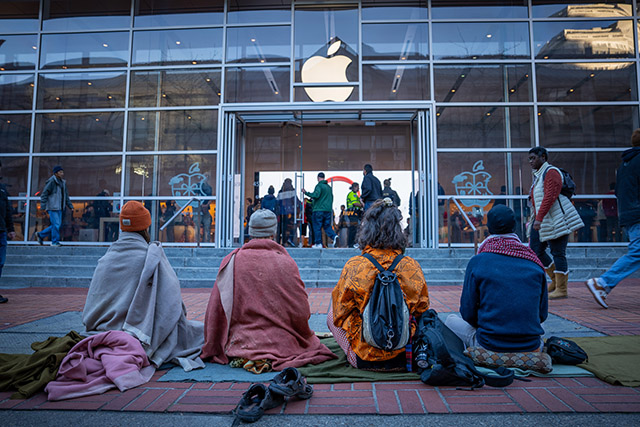
In a dharma protest against consumerism, Touching Earth Sangha members participate in “Buy Nothing Day,” the day after Thanksgiving.
Photos by: Cierra Bessler
In keeping with its central path of dharma inspired by nature, Touching Earth Sangha is considering a move to a more rural location, while it expands offerings in Portland.
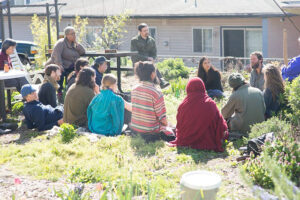
The Touching Earth Sangha is a small community of friends who gather regularly for various meditation practices, and to discuss how to apply our spiritual insights to questions of right livelihood in today’s world. We have been meeting regularly for around 20 years in Portland, almost always in outdoor locations like parks or community gardens, reflecting the centrality of the natural world to our approach.
For the past few years, the house where I and another facilitator live has functioned as a base that has allowed us to slowly expand our offerings. These include twice-monthly daylong sits on the full and new moons, quarterly three-day sits on the solstices and equinoxes, weekly indoor evening practice, and regular informal dinner gatherings. We are interested in reaching out to more people throughout the Northwest, who might be drawn to our somewhat unusual approach.
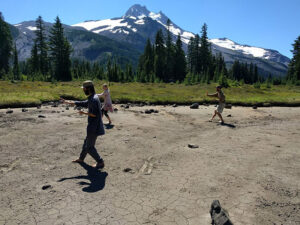
We think a move to a less urban location in our bioregion, possibly in the Bellingham area, might provide more space for a small residential community. It would also support the sangha in more freely practicing our sustainability visions – including alternative transportation, energy, and food cultivation.
We have always been non-sectarian and intentionally unaffiliated to any lineage. We feel called to help create a somewhat new spiritual culture, one with forms and intentions appropriate to our unique time and place in the contemporary United States – a society that appears to be on the precipice of major social and ecological transformations.
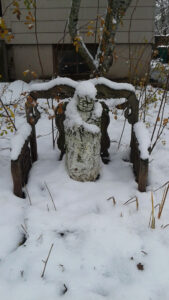
That said, we are also inspired and informed by older traditions that have come down to us – Zen Buddhism being the central one. (Zen informs my role as instigator of the group, because Zen was my own main training background).
We also practice qigong and taiji, chant in a style based on the art of Indian raga, and have circle discussions inspired by the Advaitan satsang tradition.
Perhaps what sets our group apart the most (aside from almost always sitting outside throughout the seasons), is our interest in questioning and challenging the usual daily lifestyles that most of us have grown up with in middle class contemporary America. Amidst the relentless progress of the global climate emergency, and the related serious questions of social upheaval and dysfunction made clearer than ever in the recent elections, many of us (especially younger folk) are deeply questioning the sustainability, and desirability, of remaining enmeshed in systems of capitalist consumption.
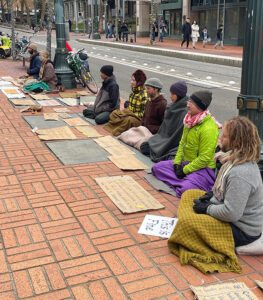
Those of us inspired by Buddhist traditions might benefit from remembering that the historical Buddha taught and lived a way of life centered on radical renunciation of much of the mainstream society around him. The simplicity and even poverty he advocated and modeled, could arguably be seen as more fundamental to his teaching and legacy than any specific meditation technique. (Not that the two can ultimately be separated. One the one hand, a life of simplicity facilitates meditative exploration. At the same time, coming alive to deep contentment in the present moment, makes it easier to joyfully surrender excess in our lives).
This question of simplicity of living is often not a particularly comfortable issue for many of us to consider personally. But it may be of crucial importance for our well-being, that we begin to consider simplicity living.
What seems to have distinguished the Buddha’s movement from many other examples of renunciation in the India of his day, was the cohesion and interdependence of his community – the sangha. Perhaps the solution to how we might make a new simpler way of life more possible, more attractive, and more joyful, can be found in this treasure of working together in community.
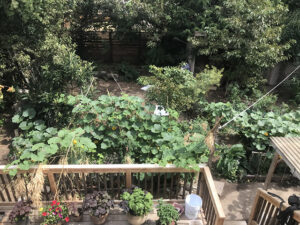
Spiritual practice groups could have a central role in igniting local cooperative networks and communities – refuges that can help maintain our basic needs, encourage necessary lifeway changes, and protect our freedom and creative expression. Touching Earth Sangha is just a tiny seed in such an endeavor, but with the right soil and compost (and the abundant Northwest rain), who knows what might sprout and grow?
Alongside our offerings of formal group practices, and the basic grounding and healing that this hopefully provides, our sangha has been involved in outreach activities that align with our vision. These have included free food distribution in parks, bicycle-powered wilderness retreats (always free), and occasional public demonstrations like our annual “Buy-Nothing-Day” downtown street sit, the day after Thanksgiving.
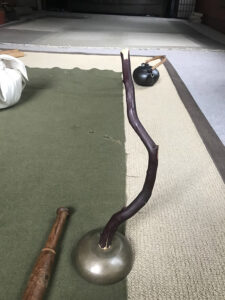
Perhaps most essential is simply fostering social connection through gatherings over shared food, where like-minded folks can feel the support and cohesion to start exploring ways we might re-envision our lives, and then taking the actual steps in doing it, together.
Ten years ago our sangha was first profiled in the Northwest Dharma News, and looking back over that report I notice not much has changed in our vision. We now have a website (in need of improvement!) and the physical base that a house provides, which we were looking for at the time. Now we are considering a move for a bit more space, perhaps the quiet of a smaller city, and more potential to grow food and have a few folks in a residential community. (Any ideas are appreciated!)
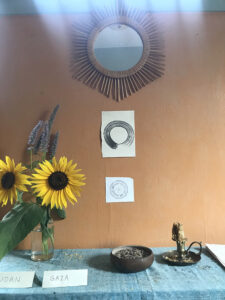
But most of all we’d like to connect with more folks – in person and also online – who might share similar inspiration, and who want to help explore how our spiritual communities might be catalysts for a new way forward. Now that it is clearer than ever that our governments are unlikely to be the source for positive change, our practice communities might have a crucial role in nourishing a new culture from the grassroots. Let’s stay in touch!
Satyavayu is the founder and spiritual director of Touching Earth Sangha. He trained at practice centers in the U.S., Japan, Korea and China; most extensively at Bukkokuji monastery in Japan, with the late Harada Tangen Roshi. He has been living as a full-time renunciant practitioner for many years in Portland, avoiding cars, planes, and as much of the capitalist system as possible. He also practices taiji, qigong, Indian Raga, and brush calligraphy. He can be reached at touchingearth(at)riseup(dot)net.
